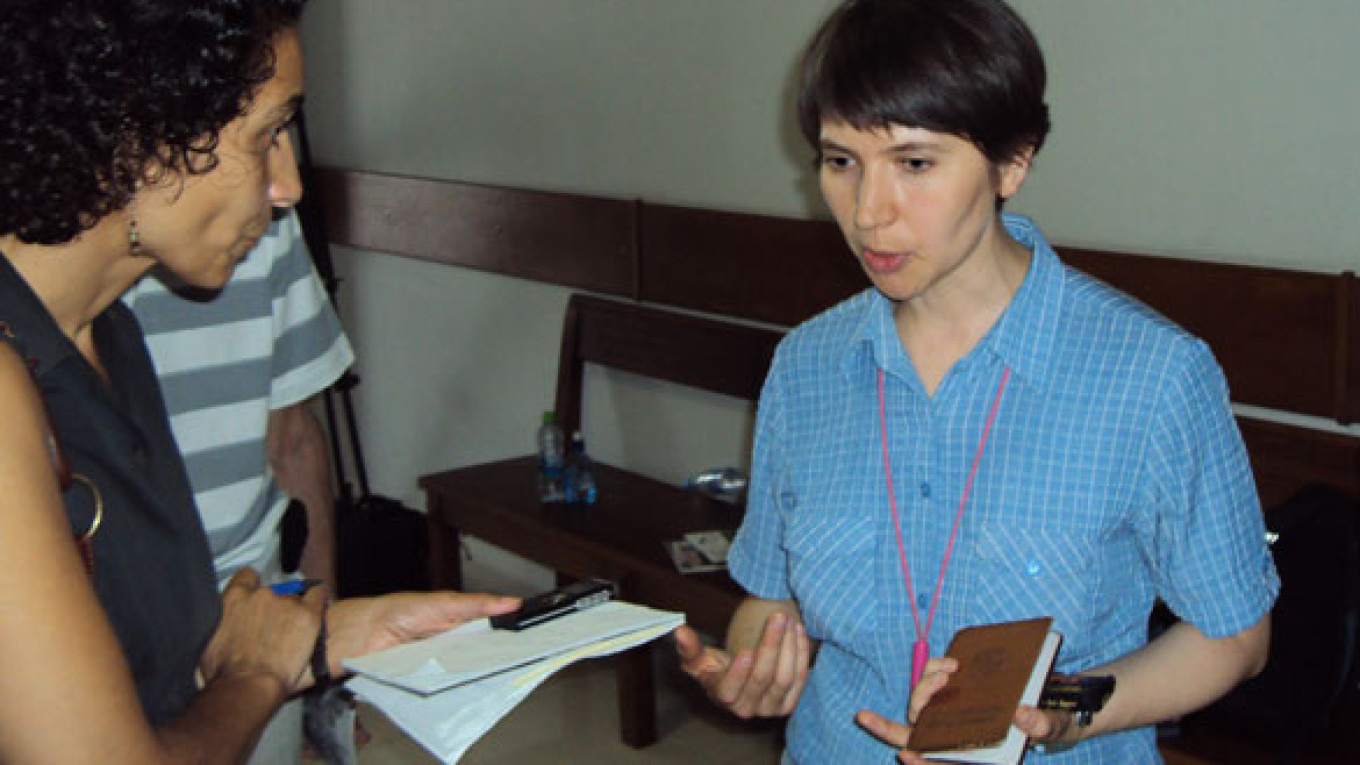A Moscow region court ruled Wednesday that an amateur poet crossed the line between art and crime by turning a youth commune into an illegal militant group and abusing several of its members.
But Yulia Privedennaya, 34, who was handed a 4 1/2-year suspended sentence, said the commune's goal was only to educate the young through poetry.
Privedennaya was convicted of being the leader of a militant group, as well as depriving people of freedom and torturing them.
Privedennaya, a senior activist with PORTOS, an acronym that stands for “The Poetic Society for Development of the Theory of the Common Good” in Russian, promised to appeal.
“We have been educating kids and bringing them to museums, but the court didn't want to find out the truth,” a shy-looking Privedennaya said as she was leaving the courtroom.
The accusations about a militant group stemmed from the fact that several air guns, hunting rifles and a pump rifle were found at the PORTOS camp. The weapons were legally owned by PORTOS members.
Witnesses claimed that a uniform-clad Privedennaya used a pellet gun to threaten commune members. She denied the accusations.
She was also found guilty of illegally holding four Ukrainian teenagers, who were forced to perform heavy work, had their freedom restricted and were spanked for misdeeds.
“Privedennaya and other group members took documents from them ... under fear of heavy punishment,” the judge said in a lengthy verdict that took him three hours to read aloud.
One of the teenagers, Vladimir Khakimov, claimed to have received 89 spanks from a senior PORTOS member on one occasion, the verdict said.
But Privedennaya said the boys were only punished for drinking alcohol and swearing. Earlier reports said she forced commune members to write poetry for means of education and to report their actions in “diaries of external happiness.”
There is no argument that strict discipline was maintained inside the camp, where PORTOS members worked as welders and construction workers and delivered food to pensioners and war veterans.
But the verdict still left questions, with several former PORTOS members who initially testified against Privedennaya later turning to her defense.
In 2008, former PORTOS member Natalya Shako said she was threatened by police to testify against her former boss.
Several activists, including former federal ombudsman Sergei Kovalyov and human rights champion Svetlana Ganushkina, have praised PORTOS for its work. But the court dismissed their testimonies because they had not visited the camp.
The verdict ends the authorities' long battle against PORTOS, which started in 2000 when the police raided the group's camp in the Lyuberetsky district near Moscow.
In 2002, two PORTOS activists were sentenced to prison terms, and two others, including the group's founder, Yury Davidov, were sentenced to mandatory psychological treatment. Davidov, who was released from a psychological hospital in 2006, died last year.
A Message from The Moscow Times:
Dear readers,
We are facing unprecedented challenges. Russia's Prosecutor General's Office has designated The Moscow Times as an "undesirable" organization, criminalizing our work and putting our staff at risk of prosecution. This follows our earlier unjust labeling as a "foreign agent."
These actions are direct attempts to silence independent journalism in Russia. The authorities claim our work "discredits the decisions of the Russian leadership." We see things differently: we strive to provide accurate, unbiased reporting on Russia.
We, the journalists of The Moscow Times, refuse to be silenced. But to continue our work, we need your help.
Your support, no matter how small, makes a world of difference. If you can, please support us monthly starting from just $2. It's quick to set up, and every contribution makes a significant impact.
By supporting The Moscow Times, you're defending open, independent journalism in the face of repression. Thank you for standing with us.
Remind me later.


